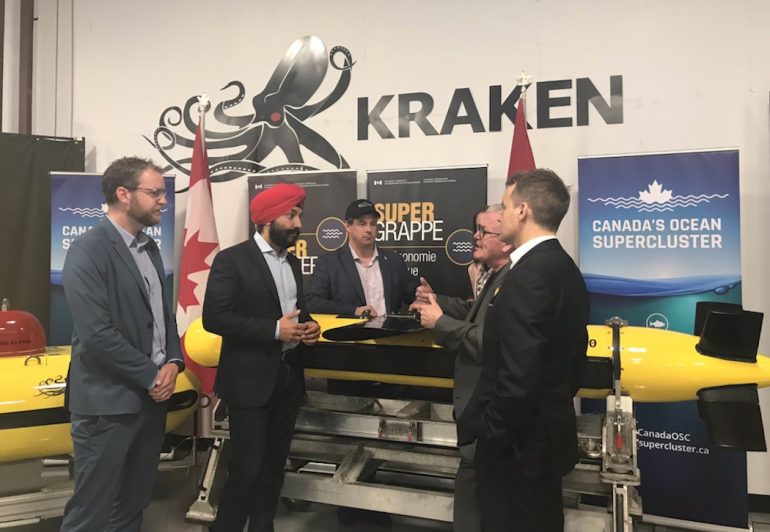The federal government has announced that the Ocean Supercluster, concentrated largely in Atlantic Canada, has conditionally approved its first project, aimed to bring seafloor maps to various industries and researchers through an underwater technology service hub.
“This project brings together a rich set of partners across multiple ocean industries that will work in collaboration to address shared ocean challenges.”
The first project will be led by Kraken Robotic Systems, a marine technology company based in Mount Pearl, Newfoundland, specializing in the design and sale of advanced sonar and optical sensors for underwater vehicles used commercially and by the military. The federal government will invest up to $5.9 million in this project through the Innovation Superclusters Initiative, and it is expected this investment will be matched at least dollar for dollar by the private sector, in the form of either cash or in-kind contributions.
“This project brings together a rich set of partners across multiple ocean industries, including fisheries, oil and gas, and ocean technology, that will work in collaboration with each other to address shared ocean challenges,” said Kendra MacDonald, CEO of the Ocean Supercluster. “This project demonstrates the level of collaboration we aim to foster as we sustainably grow Canada’s ocean economy.”
Kraken plans to work with a variety of industry and research organizations, including Petroleum Research Newfoundland and Labrador, Ocean Choice International, the Nunavut Fisheries Association, Clearwater Seafoods, and a number of small- to medium-sized businesses that have not yet been named by the government. These organizations will collaborate to create an underwater technology service hub.
RELATED: Navdeep Bains says not-for-profit model will keep superclusters accountable
The new hub will provide high-resolution images of the seafloor to organizations spanning various sectors, including oil and gas, fishing, hydrographic, search and rescue, and the military. The government said the seafloor mapping service will be done at a lower cost compared to traditional business models. One of the initiatives of this project will be the conservation of marine habitats for corals and sponges.
“The Ocean Supercluster is just getting started establishing Atlantic Canada as a global hub for ocean innovation,” said Navdeep Bains, Minister of Innovation, Science and Economic Development, “This project is an important part of the game-changing Ocean Supercluster because better knowledge of our seafloors helps us protect important habitat while extracting the full value from this rich ecosystem in a sustainable way.”
This is the fourth Supercluster to announce its initial project, as Quebec-based SCALE.AI announced four Thursday, the Prairies-based Protein Supercluster announced its first projects Wednesday, and the BC-based Digital Supercluster announced its own in March. Under the agreement signed last November, the federal government will invest up to approximately $153 million into the Ocean Supercluster. The federal government said this Supercluster is expected to add more than $14 billion to the Canadian economy over the next decade.
Image courtesy Ocean Supercluster via Twitter


